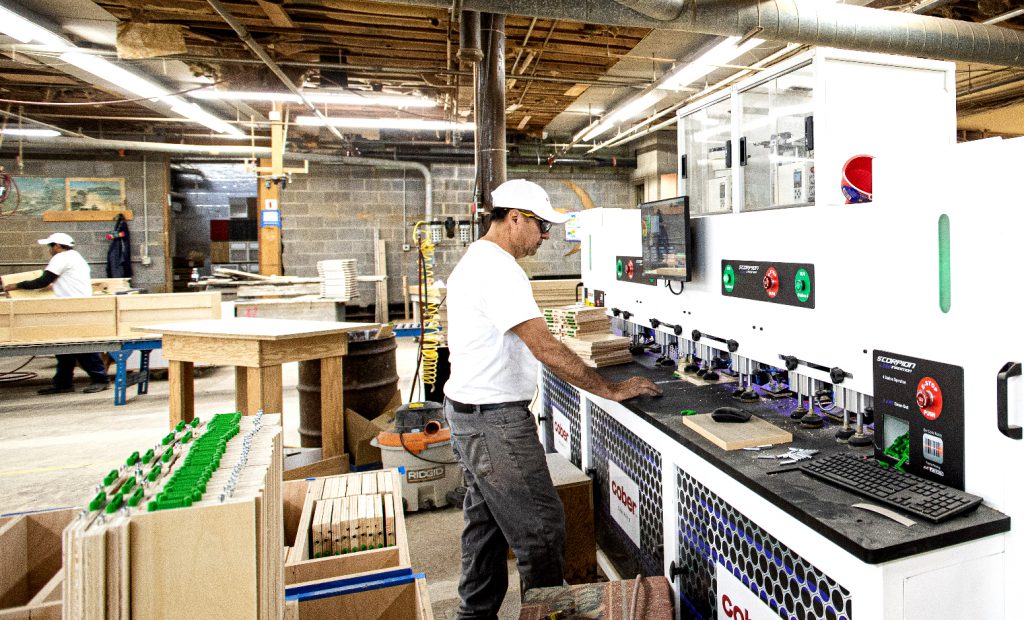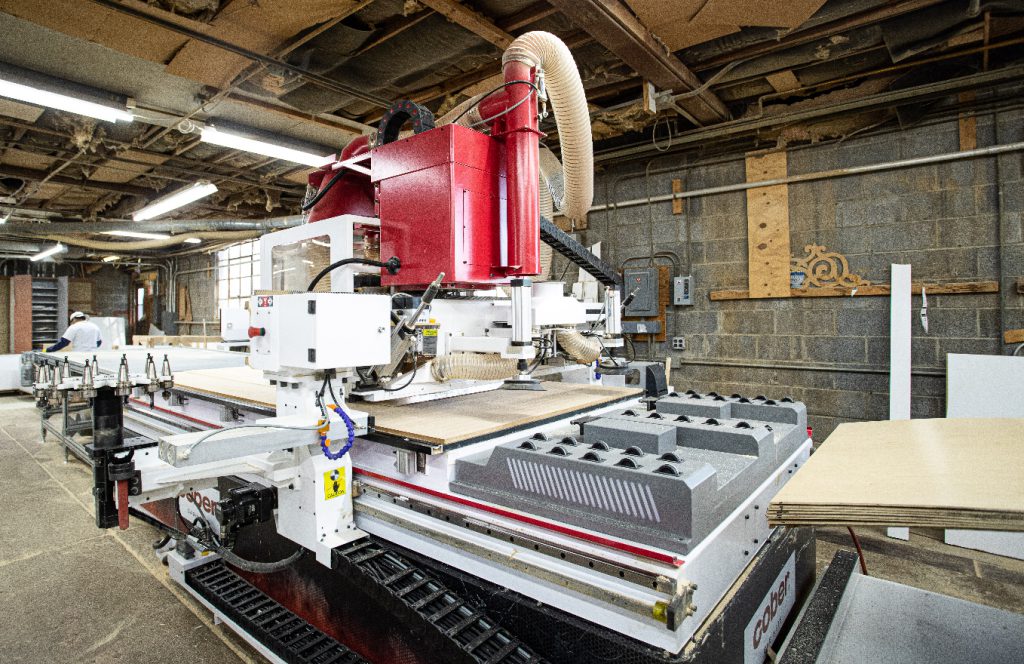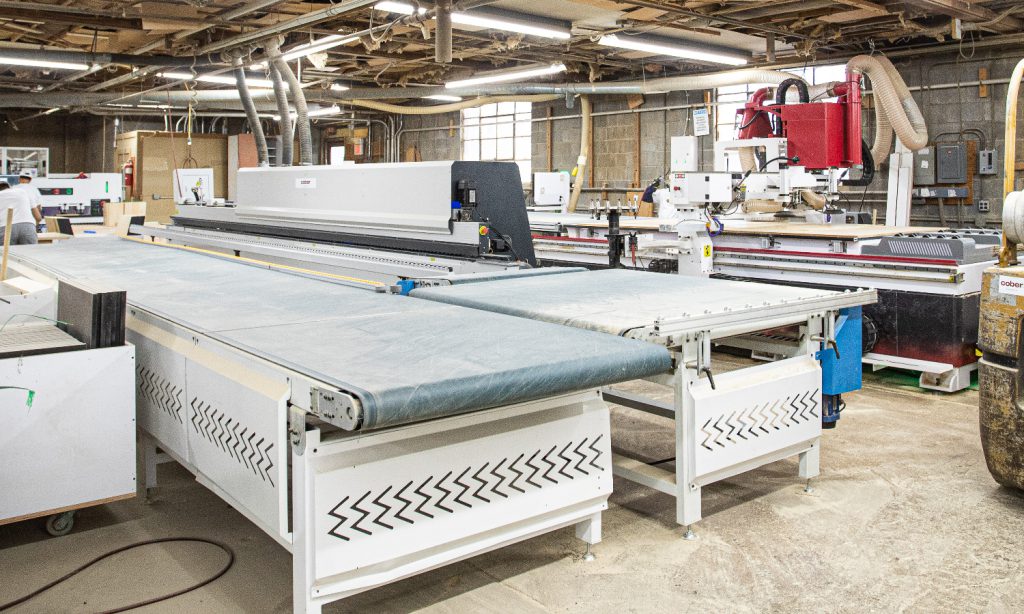How Six Cober Workers Build Hundreds of Cabinets Daily
March 11, 2022 | Guest Author
By Chaya Wieder, CEO, Cober Cabinetry, Middletown, NY
Cober Cabinets was created to fill the large vacuum in the U.S. kitchen cabinet market created by the disruption in supply chains during COVID, along with increased tariffs and shipping costs.

Builders say they are having trouble finishing homes, which can delay sales closing dates, as lead times lengthen for getting manufactured wood products to job sites. IWF Network News carried a recent report on building materials delays. Based on the latest data from Johns Burns Realty, kitchen cabinets are among the key pain points, owing to their complexity as products.

Because cabinet manufacturing is labor intensive, some builders and remodelers have turned to imports. Americans have come to rely on imported cabinetry, often supplied by U.S. manufacturers who are are simply importing components, and merely doing assembly in the U.S. But disruption in supply chains during the COVID-19 pandemic, as well as increased tariffs and shipping costs made imported cabinetry less attractive.
Our CEO and founder, Jacob Wagschal, launched Cober Cabinetry last year to fill the large void in the U.S. domestic cabinet industry.

Having family in the construction industry and hearing about cabinet shortages, Wagschal spent a good deal of time during the initial pandemic lockdown researching solutions. He concluded that imports are cheaper than domestically manufactured products only because labor is cheaper abroad, particularly in the cabinet industry.
After significant research he designed and invested in a highly efficient factory, delivering cabinets with competitive prices despite a greater metropolitan New York location.

Cober Cabinets’ highly automated and robotic machines include state-of-the-art CNC routers, PUR zero glue-joint edgebanders, 3D lamination line, and more. Wagschal’s business plan convinced a local bank and the SBA to fund Cober Cabinets, despite it being a start-ups. Cober owns its 30,000-sq.-ft building.
The platform engineered for Cober Cabinets manufactures a minimum of 100 cabinets per shift, with the capacity to reach up to 300 cabinets per shift—all with only six employees. Wagschal’s efforts in the cabinet design and build results in a high-quality final product that lends itself to automated production.
Since we have come on line, Cober Cabinets has come to the rescue of many kitchen dealers who were stuck in a contract for frameless cabinets, which their suppliers were unable to fulfill. Because our platform is technology based and scalable, we can ratchet up output quickly, outstripping competitors who aren’t as flexible. We are now considering adding shifts as needed.
In materials, we recommend our sleek, Euro-style frameless doors, but we can accommodate any style preference, including slab and shaker. Our cabinets come standard with European 6-way adjustable self-close hinge systems, touch-to-open technologies, and 3D adjustable soft-close runners. Custom lacquers and stains mean every texture and color is within reach. While raw material have slight delays, Cober’s network of solid suppliers and their delivery dates are predictable and reliable.
Builders and designers who are used to limited stock sizes and very specific lines now have more options. Cober manufactures “Custom by Quantity” to readily deliver any size down to fractions of an inch, in particleboard or solid plywood in a very wide variety of finishes both in slab and shaker doors.
Keeping the prices competitive is especially important in a market with volatile raw material costs. Cober Cabinets’ online portal, with automated pricing calculations, is structured using a unique approach, with a set fee per square inch of material used. Therefore if a customer chooses a high-end acrylic, or a more affordable TFL, or plywood over particleboard, they only pay for the difference in material cost, no upcharges on the manufacturing side.
Wagschal says Cober Cabinets‘ biggest challenge is signing up new business.
“Every new business has a hard time signing up new customers. These are generally big businesses and they are nervous about getting stuck with a company that cannot deliver. After all they are already stuck with vendors they’ve trusted for years. The way we deal with this is first to invite the customer to visit the factory: seeing is believing. These savvy business people understand the rigorous process that bankers and the SBA put a company through, especially a startup, before they are approved. This carries weight and helps convince people that this is not a factory in a garage.”
Apply to Exhibit
Grow your business at the premier global woodworking trade show.
Show Hours & Location
International Woodworking Fair
Tuesday–Friday
August 6–9, 2024
Tuesday–Thursday
8:30 AM–5:00 PM*
Friday
8:30 AM–2:00 PM*
*Building A opens 7:30 AM Tue-Fri
Georgia World Congress Center
285 Andrew Young International Blvd
Atlanta, GA 30313
